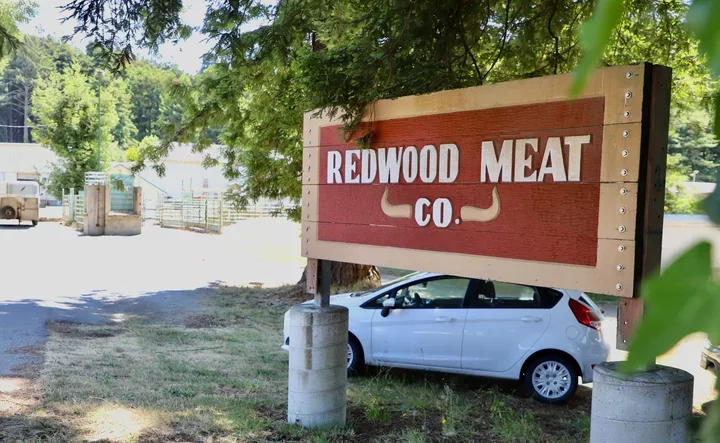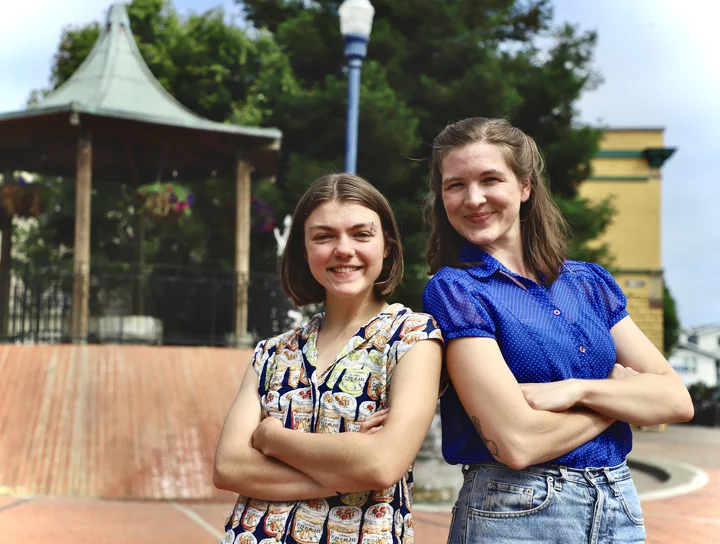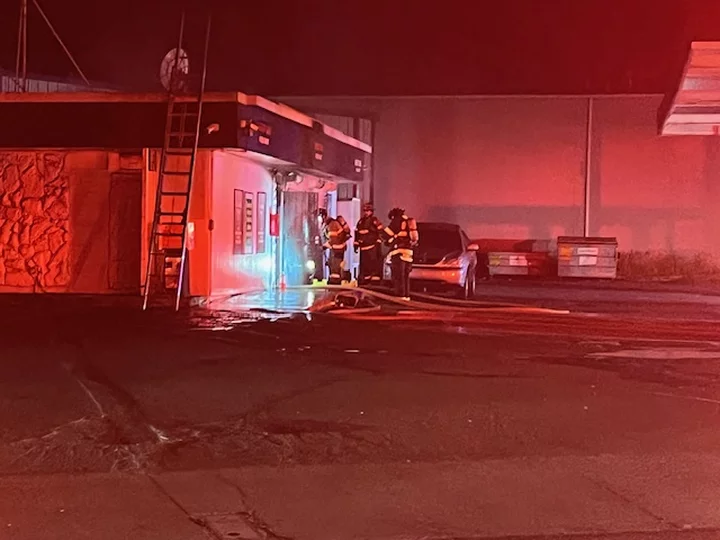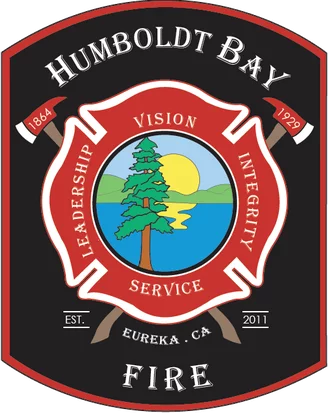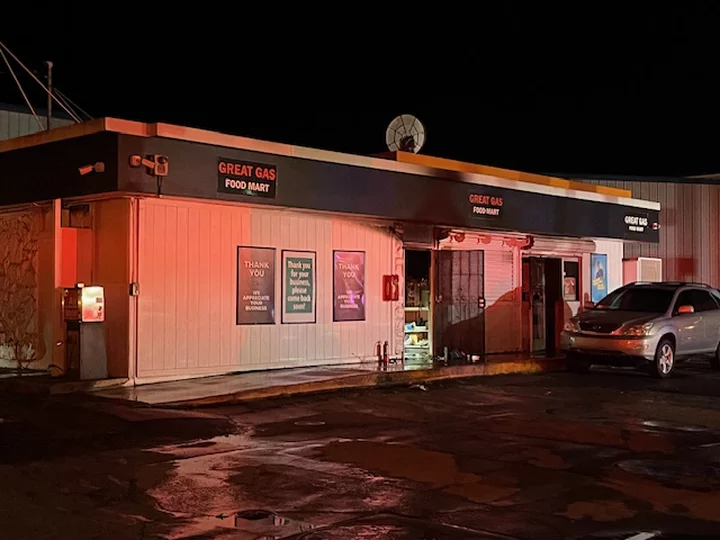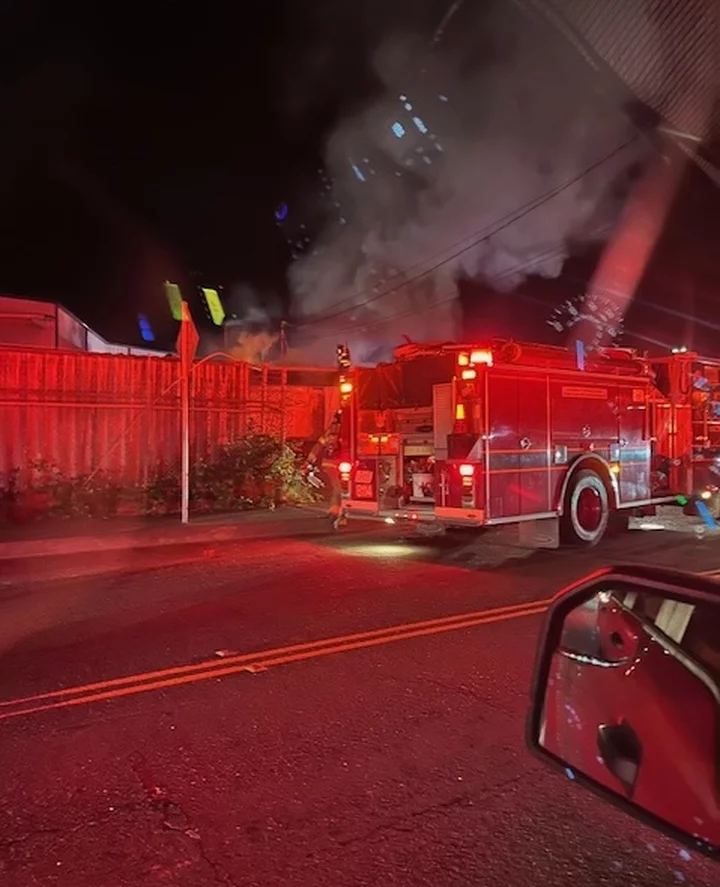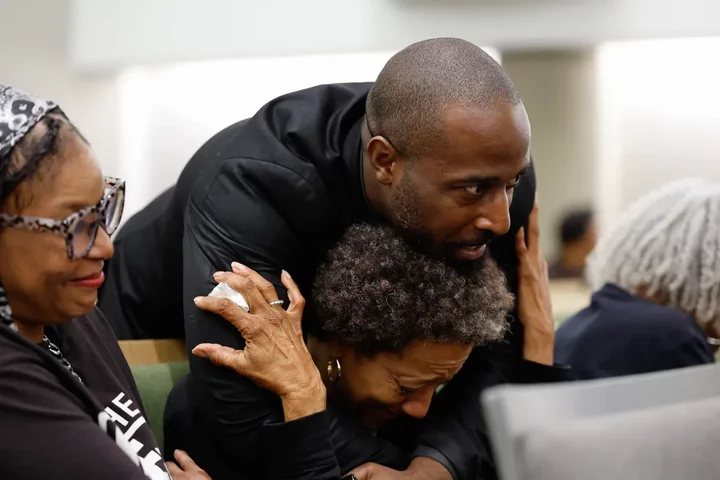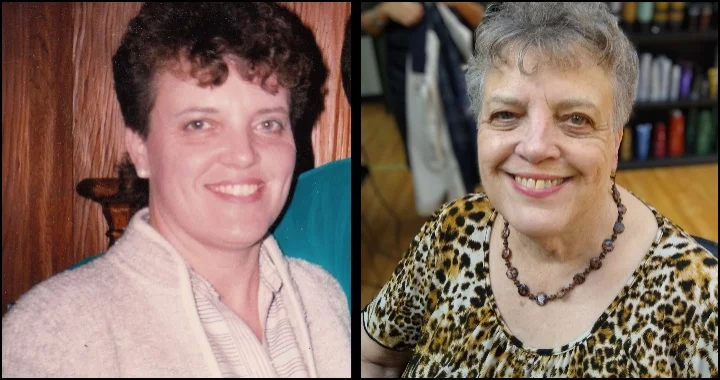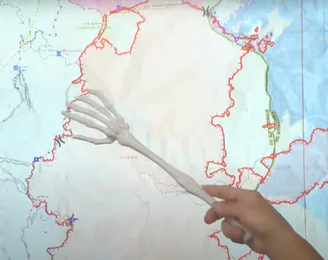Attorneys Argue Over Legality of Redwood Meat Co. Stock Sale; Judge Keeps Restraining Order in Place as Civil Case is Continued to Next Month
Ryan Burns / Friday, Aug. 16, 2024 @ 2:54 p.m. / Courts
Redwood Meat Co., located at 3114 Moore Avenue near Eureka’s Myrtletown neighborhood, has been a family-run operation for more than seven decades. | File photo by Andrew Goff.
PREVIOUSLY
- Humboldt Ranchers and Farmers Left Scrambling After Closure of Redwood Meat Co., the Region’s Only USDA-Certified Slaughterhouse and Processing Facility
- In Lawsuit, Minority Shareholders of Redwood Meat Co. Accuse Their Father and Cousin of Fraud, Embezzlement, Document Shredding and More
- Majority Owners of Shuttered Redwood Meat Co. Sell Their Shares to Accused Animal Abuser Ray Christie
###
The tempestuous family saga surrounding Redwood Meat Co. continued this morning in Courtroom Four of the Humboldt County Courthouse as a trio of attorneys argued about the legality of a recent stock transaction that gave a controlling interest in the company to notorious Arcata rancher Ray Christie.
Cyndy Day-Wilson, representing minority shareholders Stephanie, Rachel and Russel Nylander, accused the defendants, John (their father) and Ryan Nylander (their cousin) of violating a temporary restraining order when they sold their majority stake in the company to Christie earlier this month.
“The court’s order was that there was to be a maintenance of the status quo pending the resolution of this lawsuit,” Day-Wilson said, referring to a directive from Judge Timothy Canning two weeks ago. “The defendants intentionally went out and sold the corporation in violation of the [order]. … They sold control of the corporation.”
Defense attorney Dustin Owens, representing Redwood Meat Co., argued that the language of that restraining order was so “over-broad” that it effectively prohibits the company from conducting any business activities. He suggested modifications to the order “so that the business can potentially reopen and sell products or engage in business.”
Meanwhile, attorney Heather Burke, a partner at the Harland Law Firm, appeared for the first time on behalf of John and Ryan Nylander. Standing between Day-Wilson and Owens at the attorneys’ table, Burke told Judge Canning that she’d been retained by the defendants just yesterday.
The three lawyers stood shoulder-to-shoulder as they made their arguments to the judge.
Day-Wilson elaborated on an argument she submitted to the court on Tuesday, contending that Owens has a conflict of interest in the case in that he appears to be making arguments on behalf of defendants John and Ryan Nylander, rather than siding with what’s best for the company.
She said her clients received no notice before their dad and cousin sold their shares in the business, and they’ve been left powerless with a new majority owner at the helm. (She never mentioned Christie by name, though his attorney, Sacramento-based Stuart L. Smith, sat in the gallery behind her.)
“He [Christie] is going to take control of the corporation,” Day-Wilson said. “He’s going to take certain steps. He’s going to hire people, fire people, he’s going to go in and take control of property, potentially sell property. I mean, there’s lots of issues here. We don’t even know what the assets are of the corporation. We don’t even know what it is, exactly, that the shareholders allegedly sold to defendants.”
Day-Wilson, who is seeking a preliminary injunction to prevent the company from falling apart or being sold for parts without her clients’ input or involvement, said she’d been led to believe that John and Ryan Nylander needed to sell Redwood Meat Co. quickly due to the status of a conditional use permit. However, when she researched the matter, she discovered that there was no such permit — so the rush to get a deal done was based on a pure fiction.
“There was no reason this [stock sale] had to be done at this juncture,” she said. “They could have waited until the preliminary injunction hearing. Instead, they ignored the court’s order. … They went ahead and sold the stock. They sold the company.
Here, Judge Canning voiced some skepticism. He noted that she was talking about the sale of corporate assets. “But it sounds as though what was sold was the shares. That’s not a corporate asset,” he said.
“But aren’t the shares the corporate asset?” she asked.
Canning was in the midst of saying, “I don’t believe so” when a voice called out from the gallery, saying, “No.” It was Smith, the attorney representing Ray Christie.
“Excuse me!” Day-Wilson interjected, spinning around to glare at Smith. She turned back to Judge Canning. “Your Honor, you and I are having a conversation. And I don’t need, you know … .”
Canning agreed and admonished the gallery to “keep your comments to yourself.” (Smith, chastened, apologized to the court.)
From there, the attorneys argued about various other matters, including whether or not the defendants had been properly served notifications of the proceedings. Pointing out the fact that John and Ryan Nylander were in attendance, Day-Wilson said they’d clearly gotten the message.
Owens insisted that he is, in fact, looking out for the best interests of Redwood Meat Co., saying the business “needs to oppose [the restraining order] so it can operate and start making money.” He also argued that the sale of company stock did not violate that order: “Common stock is not a corporate asset.”
Burke questioned whether Day-Wilson’s clients actually own any stock, since nobody seemed to be aware of their alleged stake until recently, and she argued that a preliminary injunction is too drastic a measure in this case.
Day-Wilson assured the court that her clients are indeed shareholders and offered to supply Burke with documentation of that fact. And she stuck to her guns in asserting that the temporary restraining order has been violated.
“[I]f a preliminary injunction is not put in place, my clients are not going to have any remedy in terms of making sure the property is not sold [and the] value of the company is maintained.” While still not mentioning Christie by name, she said there is “great concern with the proposed buyer.”
Canning eventually concluded that certain factual issues need to be presented before he can rule on the preliminary injunction request. He kept the temporary restraining order in place, though he sided with Owens by making the language of that order a bit narrower. Rather than simply maintaining the status quo, the order now specifies that no actions should be taken “outside the ordinary course of business without shareholder approval at a properly noticed meeting.”
The next hearing on the preliminary injunction matter was scheduled for Wednesday, Sept. 18 at 9:15 a.m.
BOOKED
Today: 9 felonies, 10 misdemeanors, 0 infractions
JUDGED
Humboldt County Superior Court Calendar: Yesterday
CHP REPORTS
5090 Echo Ln (HM office): Trfc Collision-No Inj
ELSEWHERE
RHBB: Family Seeks Help Finding Missing Eureka Teen
Governor’s Office: Munich Security Conference: Governor Newsom reinforces climate partnerships as Donald Trump abandons long-standing American allies
Governor’s Office: Governor Newsom, German Environment Minister pledge further climate and environment cooperation at Munich Security Conference
Times-Standard : Photo | Last-minute flower shopping
PLANT DISMANTLED: They’ll Be Auctioning Off All Sun Valley Floral Farms’ Infrastructure Next Month
Hank Sims / Friday, Aug. 16, 2024 @ 1:12 p.m. / Business
Place an offer. File photo: Andrew Goff.
PREVIOUSLY:
###
The final phase of grief for a deceased industrial operation?
The auction.
The Los Angeles-based liquidator Tauber-Arons, Inc. recently announced that it will be conducting a “MASSIVE” auction of the fixed assets of Mad River Sun Valley Floral Farms, the deceased bulb giant that graced the Arcata Bottoms for several decades.
Industrial liquidation auctions were common on the Humboldt County scene around the turn of the century, during the timber industry’s precipitous decline, but this must be the first significant one we’ve seen in a while. Basically, it’s a manufacturing estate sale.
Need greenhouses? Planting crates? A big ol’ stacking robot that looks like it’s seen better days? A huge generator? A tractor? A forklift? Etc., etc? An industrial auction is a place to potentially pick them up on the cheap.
The auction will be held online from Sept. 17 through 19th. You have to qualify in advance if you’d like to bid —follow the instructions at this page — and there’ll be an opportunity to check out the stuff up for sale in advance. Here’s a whole printable brochure, if you’re interested.
If you’re new to this world, know that you’ll likely be bidding against people who make their livings buying stuff on the cheap from sales like this, then selling it for a profit. Good luck!
The Outpost Must Say Farewell to Not One But (Soon) Two of Its Star Reporters
Hank Sims / Friday, Aug. 16, 2024 @ 11:51 a.m. / Housekeeping
Opalach. Martin. Photo: Andrew Goff.
I can’t remember why we didn’t say hello, but now it is time to say goodbye. We are coming to the end, for now, of the Outpost’s acquaintance with the wonderful talents of Gillen Tener Martin and Jacquelyn Opalach, both of whom will soon be going back to school.
Martin – proud daughter of Blue Lake – is leaving us today to return to her journalism studies at the prestigious Institut d’études politiques de Paris (“SciencesPo”), alma mater of Marcel Proust, Christian Dior and every president of France since 1981.
If you can remember the last few months, you will remember that Martin turned out a surprising number of bangers for the Outpost faithful over that period of time: a report of a semi-secretive Facebook group for single women in the dating scene, an introduction to a new queer-friendly sports space, a number of profiles of interesting Humboldt people and something called “BEAR UPDATE: The Eureka Bears and the Arcata Bears and the Samoa Bears are the Same Bears, and the Mama Bear Was Hurt in a Collision With a Car.”
Read Martin’s LoCO bibliography here. What her professeurs will make of it we cannot tell.
Opalach – a McKinleyville native and an Outpost returnee, having done a tour of duty with us during the pandemic – is, thankfully, still with us for another couple of weeks. But Cal Poly Humboldt is beckoning her back, siren-like, for one final semester, and we’re not going to go so far as to chain her to her chair.
Like Martin’s, Opalach’s work over the summer has been both wide-ranging and deep. This week we published her big story about a neighborhood dispute over an industrial plant in Glendale. But she also broke national news about a rescue on the Lost Coast Trail and its weird aftermath. She had some fun with a prophetic real estate query. She wrote a inquisitive profile of an unusual teacher and her unusual students who hope to bring their unusual school (or “unschool”) to Humboldt this year.
Opalach’s entire Outpost output, dating back to September 2020, can be found here.
Here’s a strange coincidence … or maybe not so strange, when you think about it: Both Martin and Opalach were, in their day, editors of the Arcata High Pepperbox, which is one of the very few high school student newspapers left in Humboldt County, and one of the best in all the land.
Jacquelyn and Gillen have been the greatest — smart, funny, charming, hard-working. If you ever get the chance to hire them, do so.
Farewell for now! Remember: You’re paying your schools, but we paid you.
Humboldt Bay Firefighters Extinguish Early Morning Blaze at Eureka Gas Station; Minor Injuries Reported
LoCO Staff / Friday, Aug. 16, 2024 @ 9:57 a.m. / Fire
Firefighters respond to a structure fire at Great Gas in Eureka. Photos: Humboldt Bay Fire
###
Press release from Humboldt Bay Fire:
At 0340 hrs on August 16, 2024, Humboldt Bay Fire responded to a reported Structure Fire at a convenience store and gas station on the 1400 block of Broadway. Humboldt Bay Fire responded with 1 Truck, 3 Engines and 1 Chief Officer. The first arriving company found heavy black smoke pushing from inside the convenience store. One occupant had escaped the fire prior to fire personnel arriving on scene. The occupant had minor injuries.
Fire Crews quickly went to work extinguishing the fire, treating the injured occupant, removing smoke from the building and searching the building for other occupants as the fire was extinguished. There were no further civilian injuries and no Firefighter injuries.
The building sustained minor damage and the property value estimated to be saved is $400,000 and contents estimated to be saved is $3,000. Property damage is estimated at $50,000 and the loss of contents is estimated at $15,000. The cause of the fire is under investigation.
A total of 13 Firefighters and 1 Volunteer Support unit responded to this incident. HBF would also like to thank the Eureka Police Department, City Ambulance, and Pacific Gas & Electric who also assisted in stabilizing the incident.
Humboldt Bay Fire reminds the community to yield to emergency vehicles and avoid driving through emergency scenes by taking alternative routes around the incident. This leads to greater safety for all drivers and emergency personnel working at scene.
###
California Lawmakers Kill Crime Bills, Keep Reparations Proposals Alive
Sameea Kamal and Jeanne Kuang / Friday, Aug. 16, 2024 @ 7:22 a.m. / Sacramento
Supporters of the state’s reparations bills celebrate as the measures survived the Legislature’s suspense file hearings at the Capitol Annex Swing Space in Sacramento on Aug. 15, 2024. Photo by Fred Greaves for CalMatters.
California lawmakers yesterday weeded out hundreds of pricey proposals, including notable ones on crime and technology.
As they culled about one-third of 830 bills, legislative committees killed one that aimed to prohibit broadband providers from charging more or offering slower Internet service in low-income areas, and another to bar law enforcement agencies from relying solely on facial recognition to arrest or search suspects.
The committees also held several Republican crime bills, including one aimed at adding stricter reviews before the state releases sexually violent predators. That prompted the author, Senate GOP leader Brian Jones of San Diego, to state that Assembly Democratic leaders are “now complicit in helping the Newsom Administration protect these predators over families.”
Also held were two crime bills from the newest Senate Republican, Marie Alvarado-Gil of Modesto: One to increase the severity of the crime for making threats at schools or places of worship, and one that makes it a felony to have fentanyl while armed.
But other high-profile bills survived yesterday’s hearings — much to the relief of some advocates who have spent years fighting for their causes.
Chris Lodgson, an organizer with the Coalition for a Just and Equitable California, said he barely slept all night in nervous anticipation. He and a handful of others from the Bay Area and Stockton came attended the Assembly hearing to watch the outcomes of three reparations bills, including Senate Bill 1403 by Inglewood Democratic Sen. Steve Bradford, which establishes the California American Freedmen Affairs Agency.
As each of their bills came up in the fast-paced readout, the organizers gripped hands, sighed in relief — and, after all three bills survived — some burst into tears.
Lodgson said the bills represented an historic moment: “For reparations to be effective, sustainable and successful, we not only need to keep the focus specifically on this uniquely American community of descendants, we need new institutions, new resources and new ideas. Today, we move one step closer to that reality.”
The suspense file hurdle happens twice a year, as the two appropriations committees go through hundreds of bills with a price tag ($50,000 or more from the general fund, $150,000 or more from a special fund), with no discussion and few recorded votes. Besides weeding out costly bills, it’s also a notorious way for legislators to kill politically dicey bills.
Each committee decided the fate of bills passed by the other chamber. The Senate committee held 174 of 515 Assembly bills, and the Assembly panel about 100 of 313 Senate bills — a total of 33% held.
That’s similar to the 32% held of the 1,009 bills in the May suspense file hearings. But it’s higher than the 25% average over the last decade, according to lobbyist Chris Micheli.
 Members of the Senate Appropriations Committee hold a suspense file hearing at the Capitol Annex Swing Space in Sacramento, on Aug. 15, 2024. Photo by Fred Greaves fo CalMatters
Members of the Senate Appropriations Committee hold a suspense file hearing at the Capitol Annex Swing Space in Sacramento, on Aug. 15, 2024. Photo by Fred Greaves fo CalMatters
A major consideration this year: The state’s budget crunch.
Assembly Appropriations Chairperson Buffy Wicks, a Democrat from Oakland, started off the hearing with that reminder: In June, Gov. Gavin Newsom and the Legislature came to a budget agreement that closed a $47 billion shortfall for next year. Wicks said the budget situation “weighed heavy” on the committee.
Other bills that didn’t survive would have:
- Capped late fees for parking tickets and extended the time to pay;
- Created a training program for law enforcement on “transnational repression” to protect Californians from violent acts motivated by international politics;
- Overhauled the state’s wildfire hazard maps, a proposal backed by Newsom but that upset local officials;
- Required community colleges and California State Universities to provide safe parking spots for homeless students who live in their cars.
One of the most closely watched bills — to require Google and Meta to pay publishers for using news content — was sent to the Senate rules committee. That gives bill author Wicks, supporters and the opponents — a powerful coalition of tech companies — more time to negotiate.
The more than 500 bills that did get through still must win final approval before the Legislature adjourns Aug. 31 to reach Newsom’s desk. The cost of bills he signs into law will be accounted for in the governor’s January budget proposal.
While the governor’s office did not comment on the suspense file, his office pointed to his July 18 veto message on AB 1272 — a bill that would have required the State Water Resources Control Board to adopt guidelines for diversion and water use: “It is important to remain disciplined when considering bills with significant fiscal implications that are not included in the budget.”
###
CalMatters reporter Briana Mendez-Padilla contributed to this story.
CalMatters.org is a nonprofit, nonpartisan media venture explaining California policies and politics.
OBITUARY: Kathleen Ellen Kelly Burgh, 1940-2024
LoCO Staff / Friday, Aug. 16, 2024 @ 6:56 a.m. / Obits
Kathleen Ellen Kelly Burgh was born in San Francisco on April 15, 1940. She went home to the Lord on July 30, 2024, due to complications from a fall. She was 84 years old. To friends and relatives, she was known as “Kathleen,” “Kit,” “Kathy” or “Kitty.” For 69 years she was a Eureka resident and faithful parishioner of St. Bernard’s Catholic Church.
Kit’s parents moved to Seattle, Washington, and then to Eureka when she was 15. She graduated from St. Bernard’s High School and attended Humboldt State College. At 23, she married the love of her life, Richard Burgh, and settled down to create and nurture what was most important to her: a healthy, loving family.
Life-long friend Genie Wood describes her as sparkling. “She’s always had beautiful hands and she used them well making jewelry. We read every cook book in print together.” She liked to sew outfits for her family; try new recipes from her cookbook collection; and indulge in handmade crafts like ceramics and beading. For decades, she gifted her creations to family and friends. Kit spent an entire year hand-stitching a gorgeous quilt as her sister’s wedding gift. Her life was about “being there” for everyone she loved. She was talkative and outgoing, considering everyone a potential new friend. Kathy had a beautiful walk of faith.
She is survived by Richard, her (hard-working), devoted husband of 60 years; her daughter, Julie Burgh, who has provided loving care for both of her parents for decades; her daughter, Kelly, and husband Paul Brochard, and their three children: Thomas; Christian; and Laura; and her sister, Pat Whittemore.
Kit successfully fulfilled her lifelong dream, leaving a family who is profoundly blessed by her life and will always love her deeply.
Funeral arrangements were made with great care and respect by Sanders Funeral Home.
###
The obituary above was submitted on behalf of Kit Burgh’s loved ones. The Lost Coast Outpost runs obituaries of Humboldt County residents at no charge. See guidelines here.
Boise Fire Surpasses 10,200 Acres; Fire Crews Making ‘Really Good Progress’ On Containment Lines
Isabella Vanderheiden / Thursday, Aug. 15, 2024 @ 4:38 p.m. / Fire
###
As of Thursday afternoon, the Boise Fire burning south of Orleans has burned over 10,205 acres. The fire, which ignited on Aug. 9, remains zero percent contained.
In a virtual Q&A with fire officials this afternoon, Operations Section Chief Heather McRae said fire crews have made “really good progress” on the fire, establishing direct lines on the northern edge of the fire along Antenna Ridge. Incident Command’s “number one priority” is keeping the fire away from Orleans, she said.
“Crews have been focusing their efforts today in that area, getting that line good and mopped up along the top of Antenna Ridge Road,” McRae said, gesturing to the map with a plastic skeleton hand. “When the fire did go through there, some trees came down. So, we do have some fallers in there falling trees to make sure that the crews can continue to access that area safely.”
Growth has slowed on the eastern edge of the fire along Salmon River Road near Horn Creek Gap. However, there is “still some potential for that edge to grow,” McRae said.
“[Growth] is at a slow, slow pace right now,” she continued. “We have an old dozer line that was put in during the Red Salmon Complex, and that dozer line has been reopened. We have crews in there prepping that line tonight. They’re looking at utilizing a drone to go in there and do some aerial ignition. That will allow fire that is lit directly along that line to back down into that drainage, and that will become our new containment line.”
Adrienne Freeman, a public information officer for California Team 10, said the incident command team is “going to be extremely conservative” about establishing containment lines before they’ve been tested.
“Pretty much everybody on this team has been in this environment for decades, and we know how unforgiving it can be,” she said. “We are not going to put containment on the map until we know that our lines have been tested and we are confident that they are absolutely going to hold. … We’re just being extra careful and conservative about how we call it.”
Speaking to concerns about fire retardant contaminating the water supply for residents of Pearch Creek, Freeman said fire crews and community liaisons are “taking all the necessary steps to ensure that the water supply is safe.”
“We also understand that this community has seen a lot of retardant in places that maybe aren’t strategic … and I just want to assure you that we’re being extremely thoughtful about the use of retardant,” she said. “And it’s not just water systems, there are other cultural [areas] out there that we want to make sure we’re avoiding with retardant.”
There are 22 crews, 16 engines, five helicopters and two dozers assigned to the fire. There have been no reports of firefighter injuries.
Evacuation orders and warnings remain in place for residents surrounding the fire. Evacuation details can be found at the Humboldt County Sheriff’s Office Facebook or at this link.
Check out the 2024 Boise Fire Facebook page for more information. A video of this afternoon’s Q&A can be found here.
###
The Boise Fire as of this afternoon. The squares are satellite-detected hotspots: Red squares were detected within the last six hours, orange within the last 12 and yellow within the last 24.

